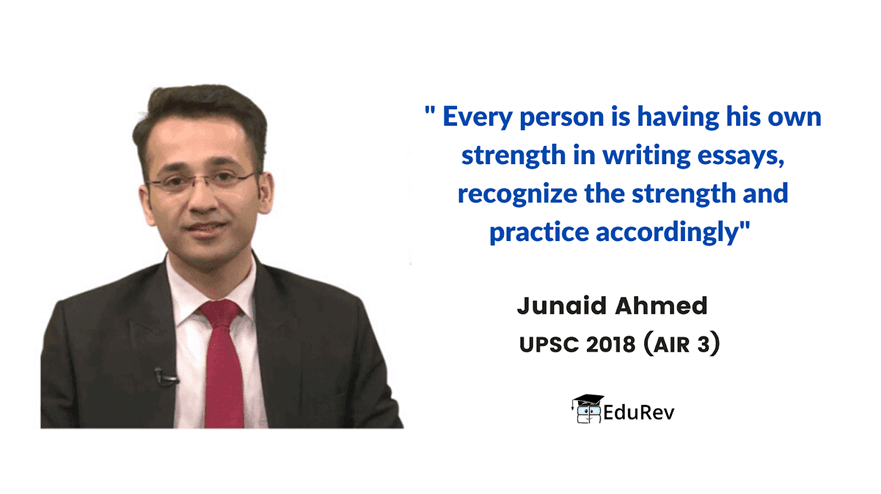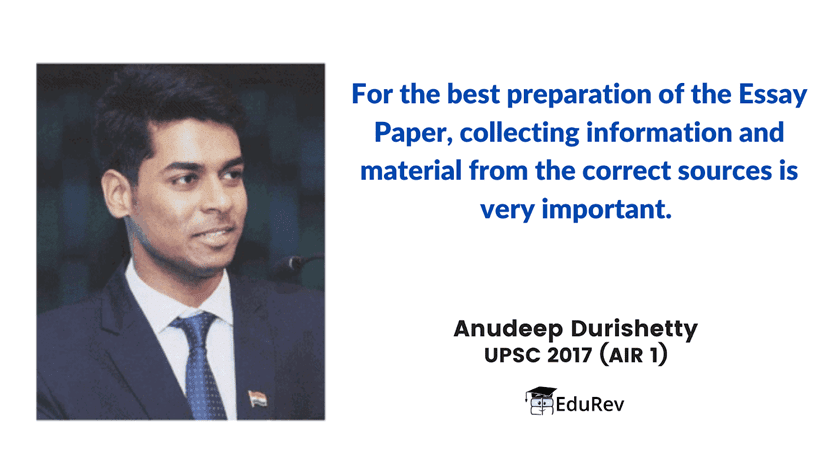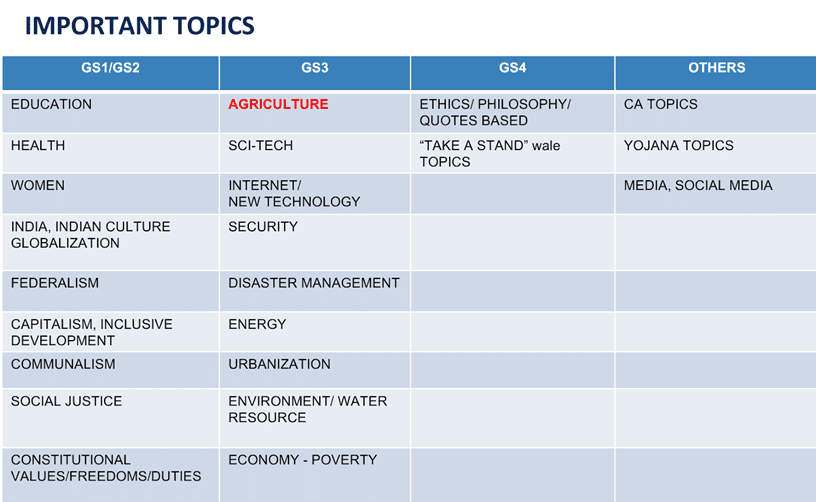How to Practice Essays for UPSC? PDF Download
The essay paper is an important aspect of the UPSC civil services exams. It can make or break your outcome. The essay paper is an area where you can let loose your creativity while displaying your knowledge about the topics. But you can write good essays only if you practice essay writing well before the exam.

How to Practice Essays for UPSC?
EduRev UPSC Experts on the advice of various IAS toppers including Anudeep Durishetty (AIR 1, 2017), Junaid Ahmed (AIR 03, 2018), Muskan Jindal (AIR 87, 2019) and others have compiled the following steps and strategy on How to Practice Essays for UPSC. So that you can attempt the section well and can get great marks in it. Go through EduRev’s course Essay for MAINS- UPSC, PCS & Other Competitive exams and practice as many essays as you can through it.
Step 1: Know the sources of preparation
For the best preparation of the Essay Paper, collecting information and material from the correct sources is very important. Here are a few sources that the aspirants must rely on, while preparing for the IAS Mains Essay Paper.
- GS + Current Affairs preparation: Preparation of Essays is done when you are studying for GS and current affairs. We have divided the topics GS-wise so that you can keep them in mind while preparing for GS.
- GS wise Important topics: Important topics based on previous 5- 10 year papers have been compiled by EduRev Experts for you. GS wise division of topics are done so that you can study the topics along with your GS preparation.

- Yojana & Kurukshetra: Magazines like Yojana/Kurukshetra/EPW/Economic Survey, etc. can be referred to for certain topics. They provide the latest statistics along with praises/criticisms of government schemes in specific sectors.
- Current Affairs: Read many good essays and articles. This will give you a feel of what constitutes a well-written essay. Build a habit of reading newspaper editorials every day. Essay questions are many times asked from current affairs. You can go through EduRev’s course: Current Affairs & Hindu Analysis: Daily, Weekly & Monthly and can practice and gather information on daily, weekly, and monthly current affairs.
- Reading Non-Fiction: Reading non-fiction books occasionally in free time helps in developing a matured process of thinking. It imparts knowledge, good figures of speech, the art of argumentation, strong rhetoric, and unique content.
- Collecting Good Stories/Quotes/Anecdotes: Note down the stories and anecdotes in newspapers and non-fiction books. Collect quotes from Eminent people too. NITI Aayog website can be followed too.
Step 2: Prepare essay topics: Gather info and Compile
- Develop a routine: No matter how much you are busy throughout the week you need to devote some time for preparing Essays. Every week one day should be fixed for example sunday and dedicated time should be devoted for essay preparation.
- Check frequently repeated topics: Prepare some material on general topics like development, women, education, healthcare, internet, technology, science, etc. EduRev Experts have compiled a list of frequently repeated topics (given in step 1). You should devote your time in preparing these topics.
- Compile Content: Devote 1-2 hour each for compiling material for the topic. Content for introduction & conclusion, quotes, schemes, relevant data, and more should be found out from the preparation sources and should be compiled. Pocket the important articles on that topic and keep them on side. Your material should include quotations, case studies, examples, government initiatives, etc. This will be useful while writing the essay.
 |
Download the notes
How to Practice Essays for UPSC?
|
Download as PDF |
Step 3: Write the Essays, Check and Compare them
- Write the essays and analyze: Write the essays on the topics in a given time limit. Know what are the distinct ways of structuring different types of essays by writing more and more. You can go through the course Essay for MAINS- UPSC, PCS & Other Competitive exams and practice as many essays as you can.
- The habit of outlining the structure: get into the habit of outlining the structures of your essays before you begin writing. Arrange the points to give it a structure and flow. This will help you ensure that you include all applicable points and important information in your paper.
- Work on previous question papers essay topic: Look toppers essays or previous year essays online or in booklets available in the market. Choose a topic, brainstorm for 15 minutes thinking of Intro, conclusion, quotes, data schemes, etc
- Compare or get your essays checked: Just writing the essays is not enough you need to compare your essays with the essays written by toppers or you can get your essays checked too. Note down extra points and learn techniques by comparing your essays to those of topper’s. You can also compare your essays through: Toppers Answer Sheets uploaded at EduRev
Follow the above three steps and start your preparation of Essays for UPSC. You can go through the document How to score 150 + in Essays? And can ace the art of writing essays.
FAQs on How to Practice Essays for UPSC?
| 1. How can I practice essay writing for the UPSC exam? |  |
| 2. How should I structure my essays for the UPSC exam? |  |
| 3. What are the common mistakes to avoid while writing essays for the UPSC exam? |  |
| 4. How can I improve my time management during the UPSC essay writing exam? |  |
| 5. Are there any specific books or resources to refer to for UPSC essay writing practice? |  |




















